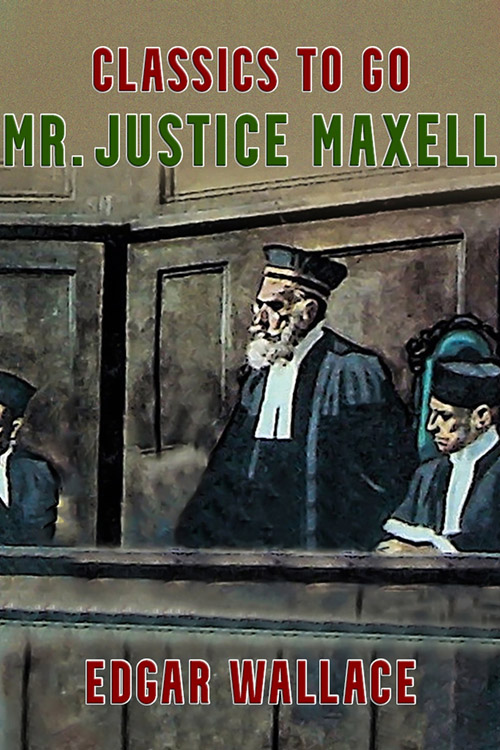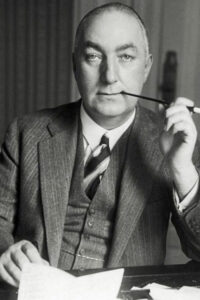
Mr Justice Maxell
Two hours after the muezzin had called to evening prayer, night had canopied Tangier with a million stars. In the little Sok, the bread-sellers sat cross-legged behind their wares, their candles burning steadily, for there was not so much as the whisper of a wind blowing. The monotonous strumming of a guitar from a Moorish cafe, the agonised barlak! of a belated donkey-driver bringing his charge down the steep streets which lead to the big bazaar, the shuffle of bare feet on Tangier’s cobbles, and the distant hush-hush of the rollers breaking upon the amber shore—these were the only sounds which the night held.
John Maxell sat outside the Continental Cafe in the condition of bodily content that a good dinner induces. Mental content should have accompanied such a condition, but even the memory of a perfect dinner could not wholly obliterate a certain uneasiness of mind. He had been uneasy when he came to Tangier, and his journey through France and Spain had been accompanied by certain apprehensions and doubts Cartwright had not dispelled.
Rather, his jovial evasions, cheery optimism, and, at times, irritable outbreaks of temper had given the eminent King’s Counsel further cause for disquiet.
Cartwright sat at the other side of the table and was unusually quiet. This circumstance was not displeasing to Maxell, for the night was not conducive to talk. There are many nights like this in North Africa when one wishes to sit in dead silence and let thought take its course unchecked and unfettered. In Morocco, such nights are typical, and Maxell had always found it difficult to discuss business matters after dinner.
Cartwright had no temperament, and his quiet was due to other causes. He broke the silence, knocking out his pipe on the iron-topped table with a bang that jarred his more sensitive companion to the very spine.
“I’d stake my life and my soul on there being a reef,” he said suddenly, almost as jarring. Why, you’ve seen the outcrop for yourself, and isn’t it the same formation as you see on the Rand?”
Maxell nodded.
Read or download Book
Edgar Wallace
Richard Horatio Edgar Wallace (1 April 1875 – 10 February 1932) was a British writer of sensational detective, gangster, adventure and sci-fi novels, plays and stories.
Biography.
Born into poverty as an illegitimate London child, Wallace left school at the age of 12. He joined the army at age 21 and was a war correspondent during the Second Boer War for Reuters and the Daily Mail. Struggling with debt, he left South Africa, returned to London, and began writing thrillers to raise income, publishing books including The Four Just Men (1905). Drawing on his time as a reporter in the Congo, covering the Belgian atrocities, Wallace serialized short stories in magazines such as The Windsor Magazine and later published collections such as Sanders of the River (1911). He signed with Hodder and Stoughton in 1921 and became an internationally recognized author.
After an unsuccessful bid to stand as Liberal MP for Blackpool (as one of David Lloyd George’s Independent Liberals) in the 1931 general election, Wallace moved to Hollywood, where he worked as a scriptwriter for RKO. He died suddenly from undiagnosed diabetes during the initial drafting of King Kong (1933).
Wallace was such a prolific writer that one of his publishers claimed he wrote a quarter of all books in England. In addition to journalism, Wallace wrote screenplays, poetry, historical nonfiction, 18 stage plays, 957 short stories, and over 170 novels, 12 in 1929 alone. More than 160 films have been made of Wallace’s work.
In addition to his work on King Kong, he is remembered as a writer of “The Colonial Imagination”, for the J. G. Reeder detective stories, and for The Green Archer serial. He sold over 50 million copies of his combined works in various editions, and The Economist in 1997 described him as “one of the most prolific thriller writers of [the 20th] century”. However, most of his books are out of print in the UK but are still read in Germany. A 50-minute German TV documentary was made in 1963 called The Edgar Wallace Story featured his son Bryan Edgar Wallace.
Life and work
Ancestry and birth
Wallace’s great-grandfather was entertainer James Henry Marriott, and his grandmother was actress Alice Marriott. Wallace was born at 7 Ashburnham Grove, Greenwich, to actors Richard Horatio Marriott Edgar (1847–1894) and Mary Jane “Polly” Richards, née Blair (born 1843).
Wallace’s mother’s family had been in show business, and she worked in the theatre as a stagehand, usherette, and bit-part actress until she married in 1867. Her husband, Captain Joseph Richards, was born in 1838 to an Irish family. He and his father, John Richards, were both Merchant Navy captains, and his mother, Catherine Richards, came from a mariner family. Joseph died at sea in 1868, leaving his pregnant wife destitute. After the birth of Wallace’s older sibling, his mother returned to the stage, assuming the stage name “Polly” Richards. In 1872, she met and joined the Marriott family theatre troupe, managed by Alice Marriott, her husband Richard Edgar, and her three adult children (from earlier liaisons), Grace, Adeline, and Richard Horatio Marriott Edgar.
Wallace’s parents had a “broom cupboard” style sexual encounter during an after-show party. Discovering she was pregnant, his mother invented a fictitious obligation in Greenwich that would last at least half a year and obtained a room in a boarding house where she lived until her son’s birth on 1 April 1875. During her confinement, she had asked her midwife to find a couple to foster the child. The midwife introduced Wallace’s mother to her close friend, Mrs Freeman, a mother of ten children, whose husband George Freeman was a Billingsgate fishmonger. On 9 April 1875, his mother took Wallace to the semi-literate Freeman family and made arrangements to visit often.






